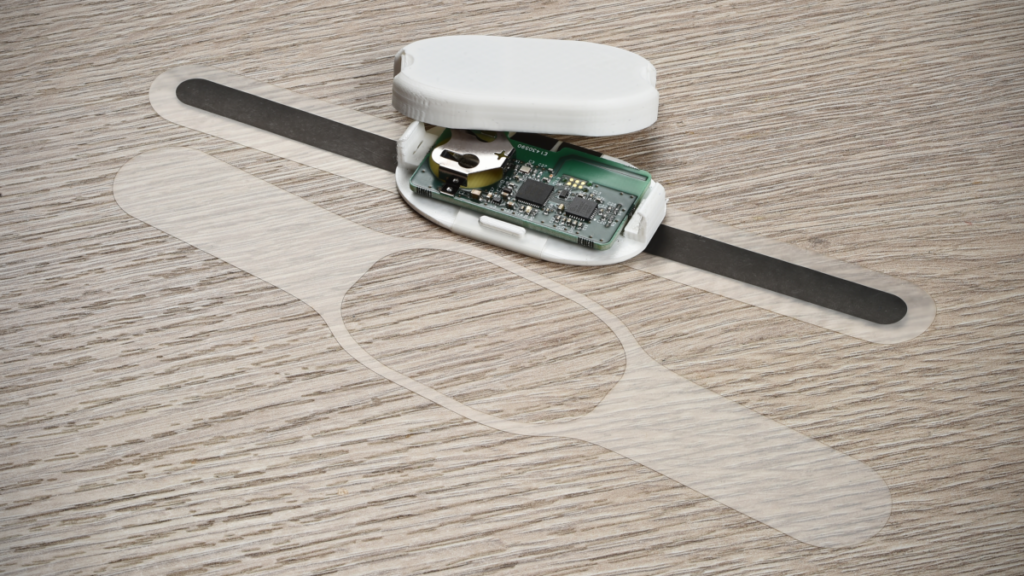The electrocardiogram (ECG) is an invaluable tool for monitoring heart conditions, as it records the heart’s electrical signals. Personal health monitoring devices, such as ECG patches and holter monitors, have become increasingly popular for medical applications due to their ease of use and relatively low cost; however, these devices are commonly made from fossil fuel-based sources that are difficult to recycle, creating a demand for sustainable materials to decrease the waste generated by the healthcare sector.
The VTT Technical Research Centre of Finland has addressed this issue by developing a fully recyclable, modular ECG patch constructed from VTT’s novel cellulose e-skin material. This device is designed such that the electronic components can be easily removed and reused. The patch itself is made of biodegradable nanocellulose and contains no plastic additives.
“The healthcare industry has one of the heaviest environmental footprints, and manufacturers are increasingly faced with regulations to make more sustainable products,” said Mohammad H. Behfar, senior scientist at VTT, in the news release.
“Bio-based substrates like cellulose e-skin are promising alternatives to fossil-based ones. The tricky part is the fact that they need to possess certain properties like stretchability, tear resistance and moisture sensitivity. We’re proud to say that with cellulose e-skin, we’ve created a new film with huge potential for use in the medical industry,” added Behfar.
XTALKS WEBINAR: Drug Delivery — Addressing Global Regulatory Challenges in Co-Packaged, On-Body Systems
Live and On-Demand: Thursday, June 15, 2023, at 10am EDT (4pm CEST/EU-Central)
Register for this free webinar to learn about on-body drug delivery systems and addressing their complex global regulatory requirements.
How Can VTT’s ECG Patch Impact the Healthcare Industry?
The healthcare industry has one of the highest emissions and carbon footprints worldwide, accounting for eight percent of total US emissions. Plastic is a preferred material for medical supplies due to its low cost, easy processing and sterilizability. Plastic accounts for 20 to 25 percent of total waste generated by healthcare facilities. Unfortunately, about 91 percent of this plastic waste from healthcare is not recycled and either ends up in landfills or contaminates natural environments.
Innovative solutions like the biodegradable and recyclable ECG patch offer sustainable alternatives to traditional plastics used in the healthcare industry, potentially reducing its carbon footprint. Given the growing demand for wearable electronics, healthcare companies cannot ignore these environmental concerns and should seek alternative sustainable materials.
Aayush Jaiswal, research scientist at VTT said, “Ours is the first nanocellulose-based ECG patch with no plastic additives. The wider implications go beyond ECG as cellulose e-skin can be used in a wide array of wearable devices in the future. The film is strong, flexible, transparent and breathable and has good printability. Potential other applications could be, for instance, in printed energy storage and harvesting devices.”
The cellulose e-skin used in the ECG patch could play a significant role in the green transition of the healthcare electronics industry. With governments offering considerable incentives for sustainable medical products, this biodegradable cellulose-based material could become the preferred choice for single-use plastic devices in the healthcare industry.
The Global ECG Patch Market
The global ECG patch and holter monitor market, estimated to be around $13 billion and projected to grow at a 17.5 percent compounded annual growth rate (CAGR), is driven largely by an increasing prevalence of cardiac arrhythmia and a rising geriatric population. The market is dominated by companies such as Nissha Medical Technologies, Medtronic, Hill-Rom Services, iRhythm Technologies and others.
There are also several ECG patches currently in clinical trials that could soon enter the market. For example, the ATP-C120 is a novel ECG monitoring device that can continuously monitor the ECG signal for up to eleven days and is being evaluated by ATsens, Seongnam, Korea.
With several big names in the ECG patch market, VTT is actively seeking collaborators to help scale up the manufacturing of their novel, sustainable wearable ECG patch.












Join or login to leave a comment
JOIN LOGIN